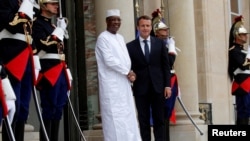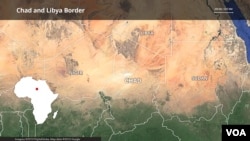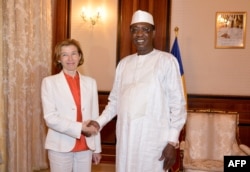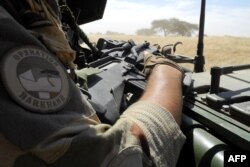When French fighter jets bombarded 40 pickup trucks of suspected insurgents last week in Chad, the former colonial power signaled an unprecedented willingness to engage openly in joint military operations in Northern Africa.
But observers, including Chadian opposition leaders, are questioning whether the airstrikes were intended to fight terrorism or prop up President Idriss Déby, who has led Chad for nearly 30 years.
“The French launched the airstrikes themselves, and they did not even try to make it seem as if they were not interfering with Chadian politics,” said Marielle Debos, an associate professor at Paris Nanterre University. Debos, who has researched the country for more than a decade, told VOA in the past the French army’s support has been more discreet.
On February 3, French jets attacked a convoy of heavily armed pickup trucks that had entered Chad from neighboring Libya. The strikes lasted four days.
France said it had responded to a request for assistance from the Chadian government, calling the country an essential partner in the fight against terrorism.
Chadian officials said the attacks were legal and necessary to prevent terrorist activity.
“Both the French and the Chadian governments were portraying this as a decision that they undertook together,” said Alex Thurston, an assistant professor in political science and comparative religion at Miami University, in Oxford, Ohio.
Joint operation
The planes flew from N’Djamena, Chad’s capital, where France headquarters its 4,500-person anti-terror mission, Operation Barkhane.
“There are agreements between states. Operation Barkhane covers a number of countries, and their role is precisely to fight terrorism,” said Mahamat Zen Bada, the secretary general of Chad’s ruling party, the Patriotic Salvation Movement, or MPS.
“If a column [of fighters] enters Chad, and that column is not a column of the Chadian army, it is normal for people to intervene,” VOA’s French-to-Africa Service reported Bada as saying.
But others are questioning why France would attack a rebel group on behalf of Chad, an ally with a spotty record on human rights and democracy.
The opposition party denounced the airstrike.
“We condemn the intervention of France in the internal affairs of Chad,” said Célestin Topona, the first vice president of the National Union for Development and Renewal.
“We want a truly inclusive dialogue to know why, 30 years after the MPS took power, the instability continues,” Topona added.
Historical ties
France has intervened on behalf of Déby before.
In 2006 and 2008, when rebels based in Sudan advanced to the capital, France helped the Chadian Army repel the attacks with logistics and intelligence support.
“It’s possible — highly possible — that without French support that he would’ve been overthrown at the time,” Thurston said. “I think the French government sees a strong interest in keeping him in power.”
Although Barkhane has been operational since 2014, France established another military operation in Chad, Épervier, in 1986, under former President Hissène Habré.
At the time, France was backing Habré, before Déby and his supporters removed him from power.
“What is striking in this history is the fact that the French,” for the most part, “never left Chad,” Debos said. “There has been a succession of military interventions in Chad, and Barkhane is the latest of this military intervention.”
‘French interests’
After years of instability, Chad has gained a newfound stature as an important regional player, especially in joint security operations.
“Chad has long been considered as a very unstable and conflict-ridden country, but for the past eight years, it has acquired a new regional and global status,” Debos said. “It is now considered as a regional power.”
That’s raised the stakes for France.
“The French tend to point to issues of border security and stability and so forth and to say that the Chadian regime should not be overthrown by rebels and that it’s a key partner for them,” Thurston said.
“This does raise questions about what is the French government’s understanding of so-called counterterrorism in the region, and what are the French interests in Chad,” he added.
Andre Kodmadjingar of VOA’s French-to-Africa Service contributed to this report from N’Djamena.
















